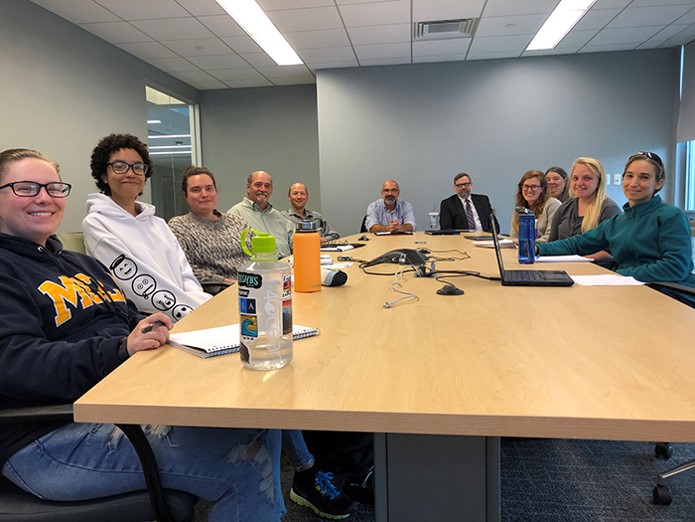A focus on campus sustainability
 The MCLA Sustainability Committee at a meeting prior to the COVID-19 pandemic.
The MCLA Sustainability Committee at a meeting prior to the COVID-19 pandemic.
MCLA has ramped up its efforts to reduce waste on campus, from composting to recycling e-waste like batteries and electronics.
Environmental Studies Professor and current MCLA Sustainability Coordinator Elena Traister and MCLA Dining Services Production Manager Renee Royal recently presented an overview of MCLA’s waste reduction practices at RecyclingWorks Massachusetts’ virtual WasteWise Forum. Traister is also meeting virtually with staff at Emmanuel College in Boston to share MCLA’s experiences.
The College has its own Campus Sustainability Committee, but, says Traister, “the real work has to be done by students.” She’s worked with many interns and work-study students over the last few semesters. “They’ve done an amazing job,” she said.
Amanda Bortman ’21 is working with Traister this semester and is helping spearhead a food waste collection program at the Flagg Townhouses. “She has really creative ideas,” Traister said. In addition to maintaining the bin area, “Amanda has been keeping an eye on this and communicating with the students, making sure they know how it works, and following up on any questions and feedback.”
 Cassandra Wright ’22 did research into what other schools were doing and conducted
a “bin audit,” surveying the number of recycling and trash bins on campus and creating
a spreadsheet that’s still in use. She worked with the Facilities Department to place
additional recycle bins on campus; recent grad Jahshyah Love ’20 designed posters
and fliers to place on the bins explaining what gets recycled and what gets trashed.
Cassandra Wright ’22 did research into what other schools were doing and conducted
a “bin audit,” surveying the number of recycling and trash bins on campus and creating
a spreadsheet that’s still in use. She worked with the Facilities Department to place
additional recycle bins on campus; recent grad Jahshyah Love ’20 designed posters
and fliers to place on the bins explaining what gets recycled and what gets trashed.
MCLA Dining is a valuable partner in sustainability efforts, and has amped up its efforts to reduce food waste, with trainings on preparing vegetables and a system that weighs food scraps and analyzes data on pounds of food scraps. Pre- and post-consumer waste is collected in bins with sawdust, then picked up by Casella Waste Systems, which adds it to its existing compost program based in Vermont.
The pandemic, and new restrictions on how food can be served, have made things a bit more complicated, but the Sustainability Committee is developing new processes for collecting post-consumer waste. “We have to protect human health—now that those policies are in place, we’re interested in seeing how much we can reduce what we’re throwing out,” Traister said. Most grab-and-go meals are served in compostable containers already, and MCLA Dining has partnered with the College food pantry to offer frozen meals, further reducing waste and offering an option for students facing food insecurity.
 MCLA’s TV studio and IT Department collect e-waste, or electronic waste, and hold
onto it for annual recycling; at the end of every semester, Residential Programs and
Services sets up donation stations for things students don’t want anymore, including
old electronics, for collection. The Facilities Department collects used batteries
so they can be disposed of in the right way, and there are now battery collection
stations across campus, including in the Amsler Campus Center and Freel Library. A
new partnership with BFAIR in North Adams, which runs a redemption center that employs
individuals with disabilities, has placed specific bins for redeemable cans and bottles
across campus, with the redemption money going to the local nonprofit.
MCLA’s TV studio and IT Department collect e-waste, or electronic waste, and hold
onto it for annual recycling; at the end of every semester, Residential Programs and
Services sets up donation stations for things students don’t want anymore, including
old electronics, for collection. The Facilities Department collects used batteries
so they can be disposed of in the right way, and there are now battery collection
stations across campus, including in the Amsler Campus Center and Freel Library. A
new partnership with BFAIR in North Adams, which runs a redemption center that employs
individuals with disabilities, has placed specific bins for redeemable cans and bottles
across campus, with the redemption money going to the local nonprofit.
Traister says she’s proud of MCLA’s efforts and the continued commitment to reducing waste on campus. “There are great folks on the Sustainability Committee at MCLA that are interested in having those conversations,” she said.
